Key takeaways:
- Skill development involves understanding personal learning styles, setting measurable goals, and embracing a growth mindset.
- Educational publishing significantly impacts knowledge dissemination and supports lifelong learning through innovative resources.
- Collaboration and feedback from peers enhance learning and can lead to substantial personal growth.
- Regular reflection on progress and emotional checkpoints helps define success and motivates continuous improvement.
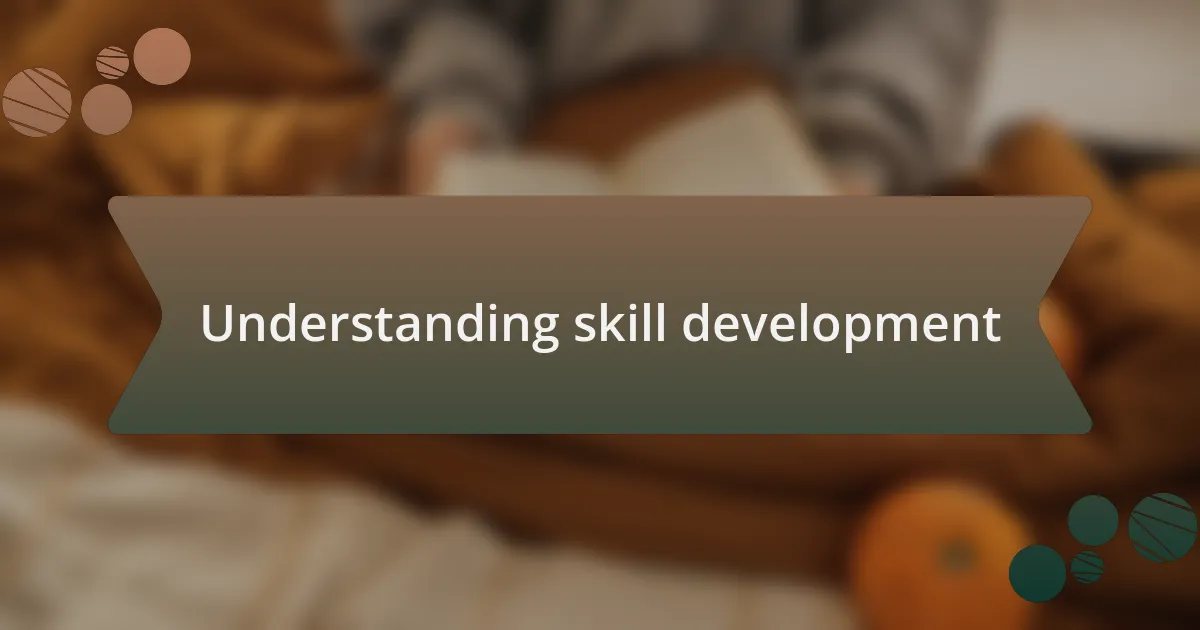
Understanding skill development
Skill development is a multifaceted process that involves acquiring new abilities or refining existing ones. I often think about the countless hours I spent learning to code; the initial frustration was enough to make me question my choices. But then, as I began to grasp the concepts, each small success fueled my determination. Have you experienced that rewarding feeling when a new skill finally clicks?
Engaging in skill development also means understanding your unique learning style. For instance, I’ve realized that I learn best through hands-on experience rather than traditional textbooks. I remember a workshop where I had the opportunity to collaborate on a project. The team dynamic not only enhanced my understanding but also ignited a passion I didn’t know I had. How do you prefer to learn?
At its core, skill development is about growth and adaptation. I often reflect on how my approach has evolved over the years; what once felt monumental now seems approachable. It’s essential to embrace the challenges along the way, as each obstacle can pave the way for deeper insights. What obstacles have you faced that ultimately led to your growth?
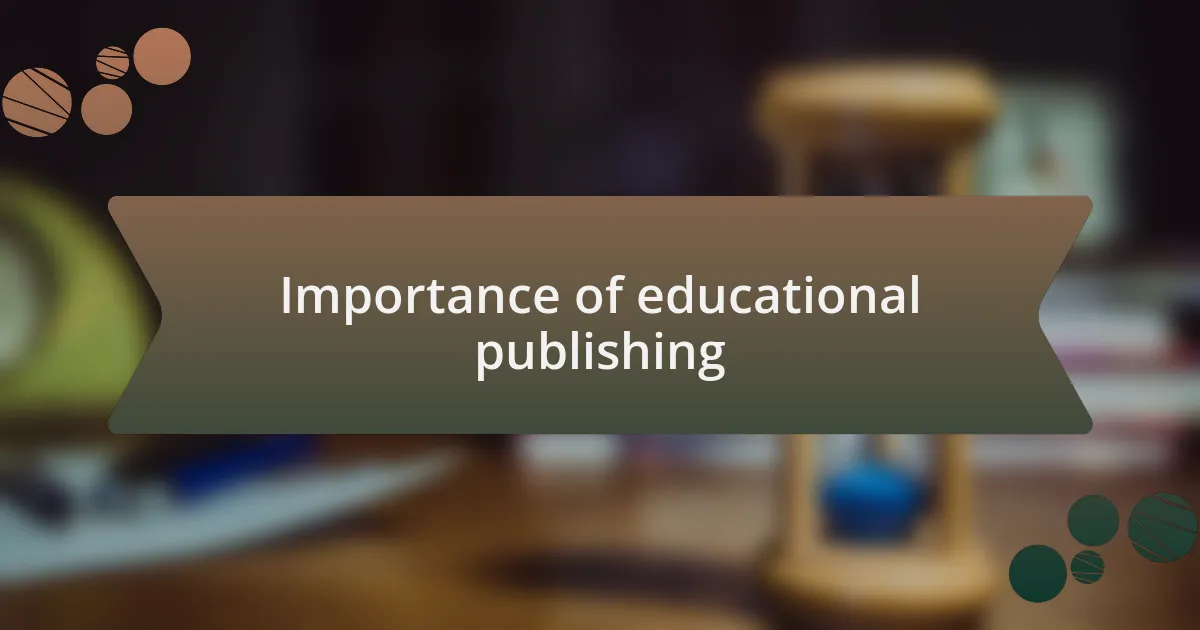
Importance of educational publishing
Publishing educational materials plays a pivotal role in shaping how knowledge is disseminated and accessed. I recall a time when I stumbled upon a well-crafted textbook that transformed my understanding of a challenging subject. It was like finding a key to a door I had been struggling to open. Have you ever found a resource that helped clarify a complex topic for you?
Moreover, educational publishing fosters innovation in teaching methods and learning strategies. I remember coming across an interactive e-book that allowed me to engage with content in dynamic ways. This made learning less of a chore and more of an adventure. Can you think of a time when a creative approach to learning sparked your interest in a topic?
Ultimately, the importance of educational publishing lies in its ability to support lifelong learning. I often reflect on how the books and resources I’ve encountered have not only educated me but also inspired me to pursue new interests. Is there a particular publication that changed your perspective or opened new doors for you?
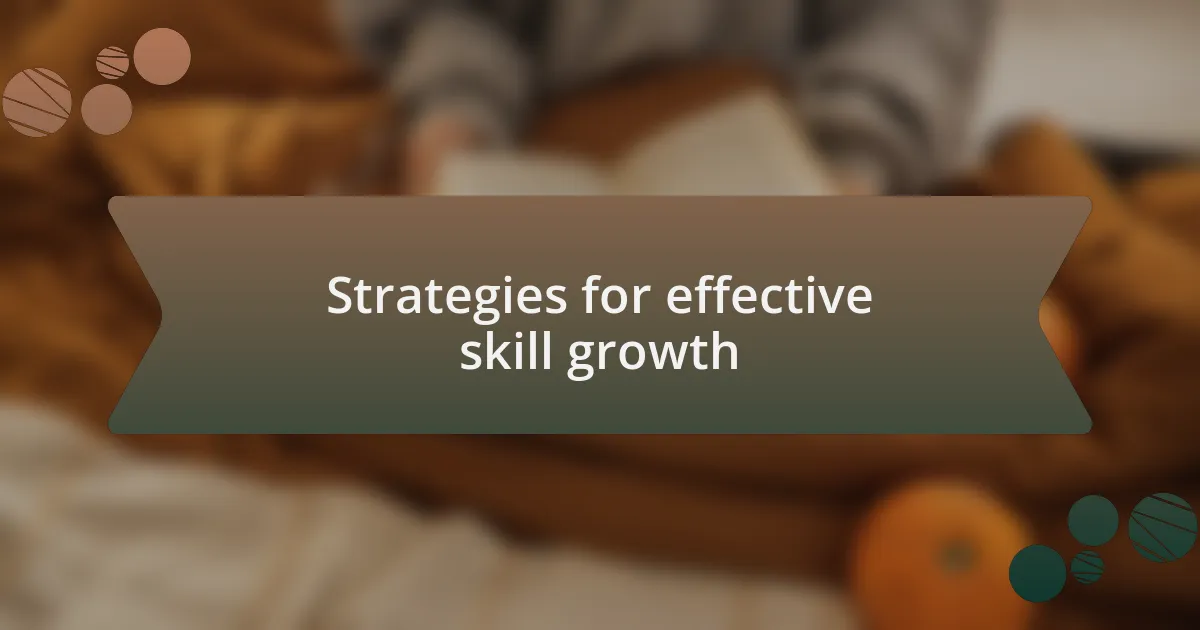
Strategies for effective skill growth
One effective strategy I’ve found for skill growth is setting specific, measurable goals. For instance, when I wanted to improve my writing, I committed to writing 500 words daily for a month. This approached transformed my practice into a habit, which not only enhanced my writing skills but also boosted my confidence. Have you ever noticed how having a tangible target can motivate you to engage more deeply with your learning?
Another method that has proven beneficial is seeking feedback from peers or mentors. I remember asking a colleague to review my presentation skills; their insights uncovered blind spots I wasn’t aware of. How often do you seek outside perspectives to refine your abilities? Engaging with constructive criticism can often illuminate the path toward improvement.
Lastly, embracing a growth mindset has been transformative for my skill development. I aim to view failures as stepping stones rather than setbacks. After a project didn’t go as planned, instead of feeling defeated, I analyzed what went wrong and applied those lessons to future endeavors. Have you found that shifting your perspective on challenges can lead to deeper learning?
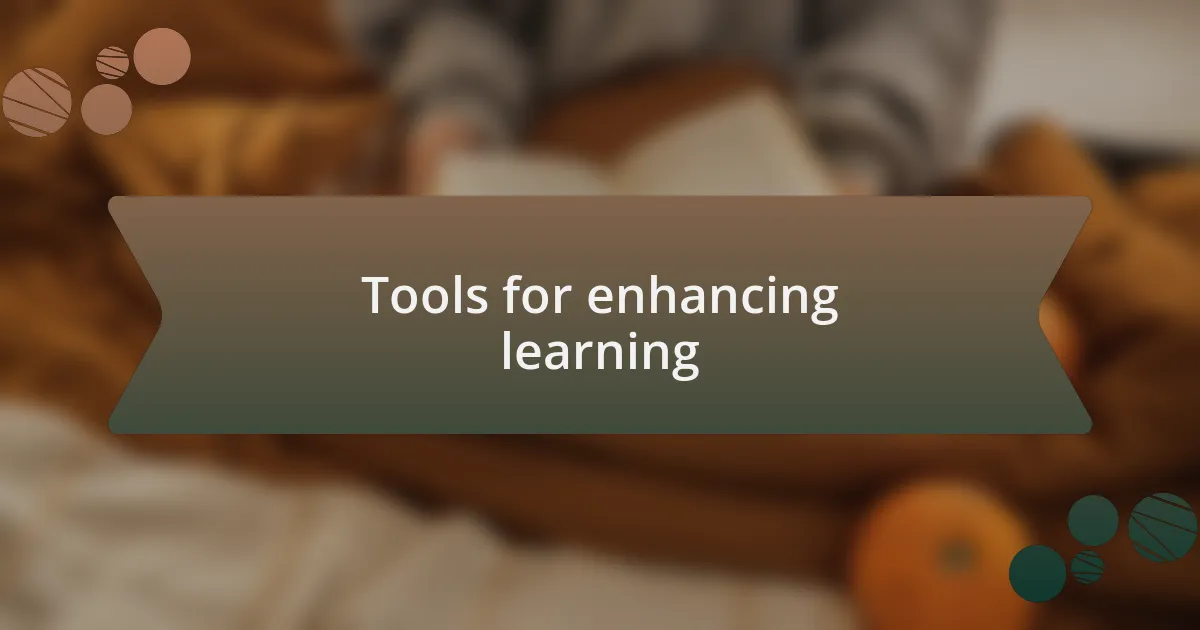
Tools for enhancing learning
Tools can significantly enhance the learning process, making it not just efficient but also engaging. One tool that has worked wonders for me is the use of interactive apps like Duolingo for learning new languages. When I first started, I was surprised by how gamified elements kept me motivated. Have you experienced how a little friendly competition with yourself can spark excitement in the learning journey?
Another resource I often utilize is online collaboration platforms like Google Docs. I remember each time I collaborated on a project, the exchange of ideas brought new dimensions to my understanding. It’s fascinating how working with others can elevate not only the project outcome but also my own grasp of the subject. Don’t you feel that group dynamics can sometimes push us towards breakthroughs we might not achieve alone?
Additionally, I find that video tutorials are invaluable for grasping complex concepts. For example, when I struggled with a particular software, watching step-by-step guides made a significant difference. Those visual representations turned confusion into clarity. What about you? Have you also found that seeing something in action can resonate more than reading about it?
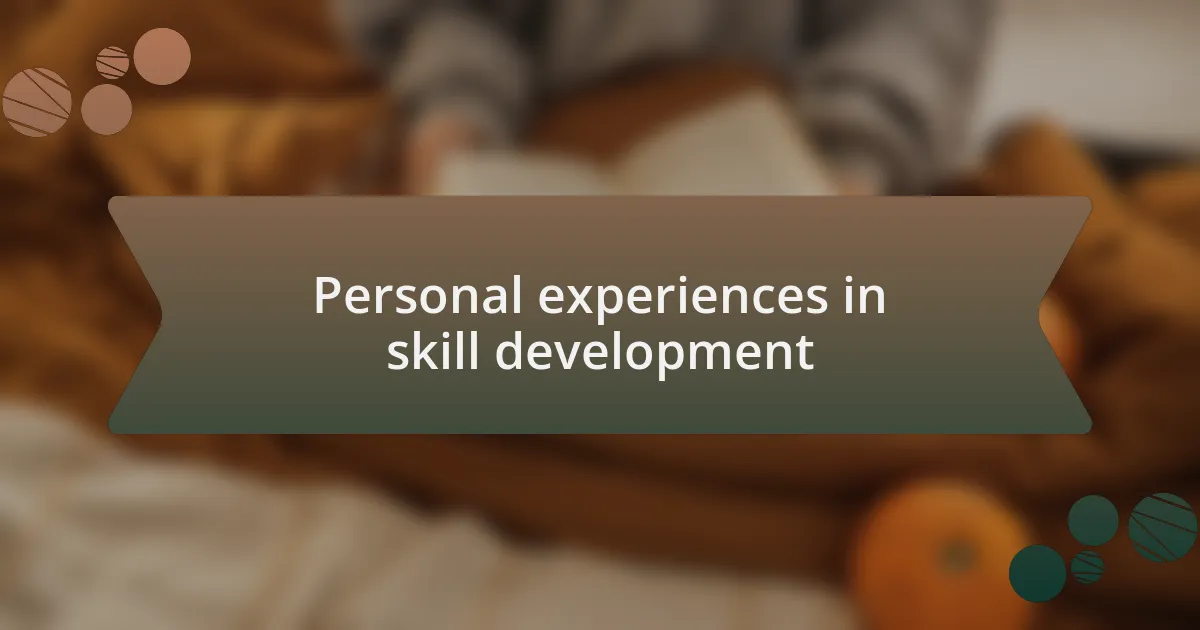
Personal experiences in skill development
Skill development often intertwines with personal experiences that shape our approach to learning. I recall my journey with public speaking; the first time I stood in front of a crowd, my heart raced, and I feared stumbling over my words. However, through consistent practice and seeking feedback, I gradually transformed that anxiety into confidence. Have you ever faced a situation where persistence turned fear into strength?
Another memorable experience was when I ventured into coding. Initially, the concepts felt like a foreign language, leaving me frustrated. However, I enrolled in a local workshop, where the hands-on, collaborative environment ignited my passion for problem-solving. I remember the thrill of finally debugging my first program and the sense of accomplishment that came with it. It’s amazing how the right community can light a fire within us, don’t you think?
Reflection is also a powerful tool in skill development. After completing a project or learning a new skill, I often take time to evaluate what worked and what didn’t. One time, I realized that taking breaks actually helped my creativity flow better, allowing me to approach challenges with a fresh perspective. Have you tried pausing to reflect on your learning experiences? It can lead to profound insights that propel us forward in our journey.
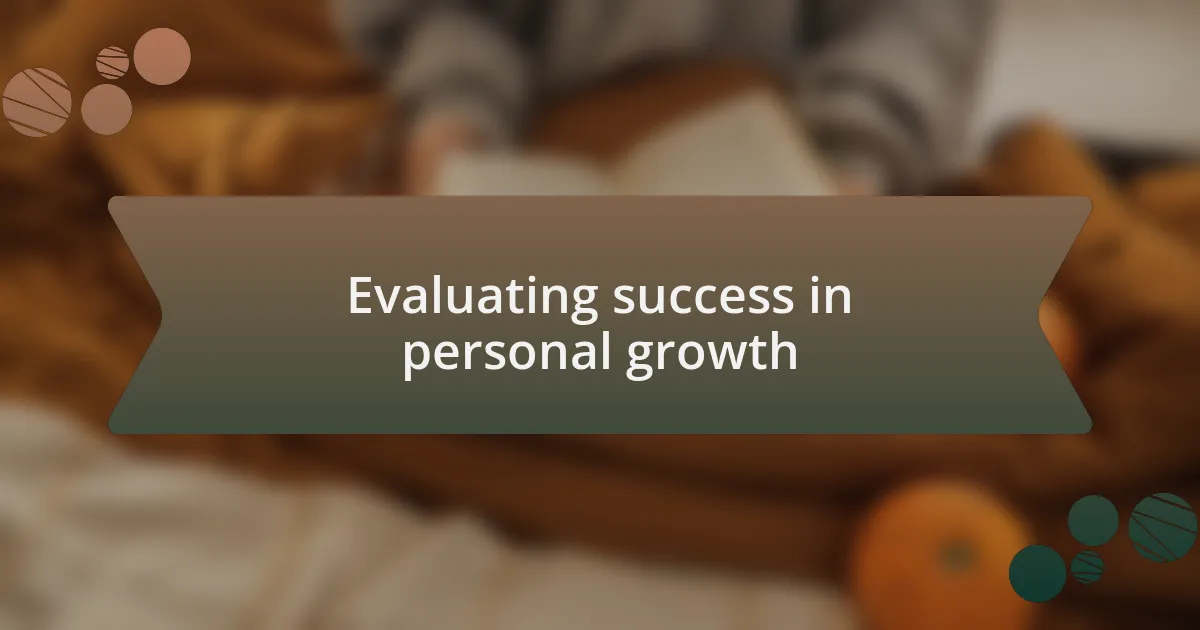
Evaluating success in personal growth
Assessing success in personal growth can often feel elusive, yet I’ve learned the importance of setting measurable goals. When I decided to improve my writing skills, I tracked my progress by setting specific targets, such as completing a certain number of articles each month. This way, I could clearly see my improvement over time, which was incredibly motivating. How do you define your milestones?
In my experience, emotional checkpoints are just as important as tangible achievements. I distinctly recall the moment I finished my first comprehensive report after a long week of revisions. That overwhelming sense of satisfaction reminded me that growth isn’t just about ticking boxes but also acknowledging the joy that comes from overcoming challenges. Have you ever experienced a moment like that when your hard work truly resonated with you?
Sometimes, reflecting on feedback is what truly highlights our growth. I often seek input from peers and mentors after completing projects. After receiving feedback on a presentation, I was initially taken aback, but the constructive criticism helped refine my skills. It’s a reminder that success isn’t always about personal satisfaction; it can also come from others recognizing our potential. What feedback have you received that reshaped your perspective on success?
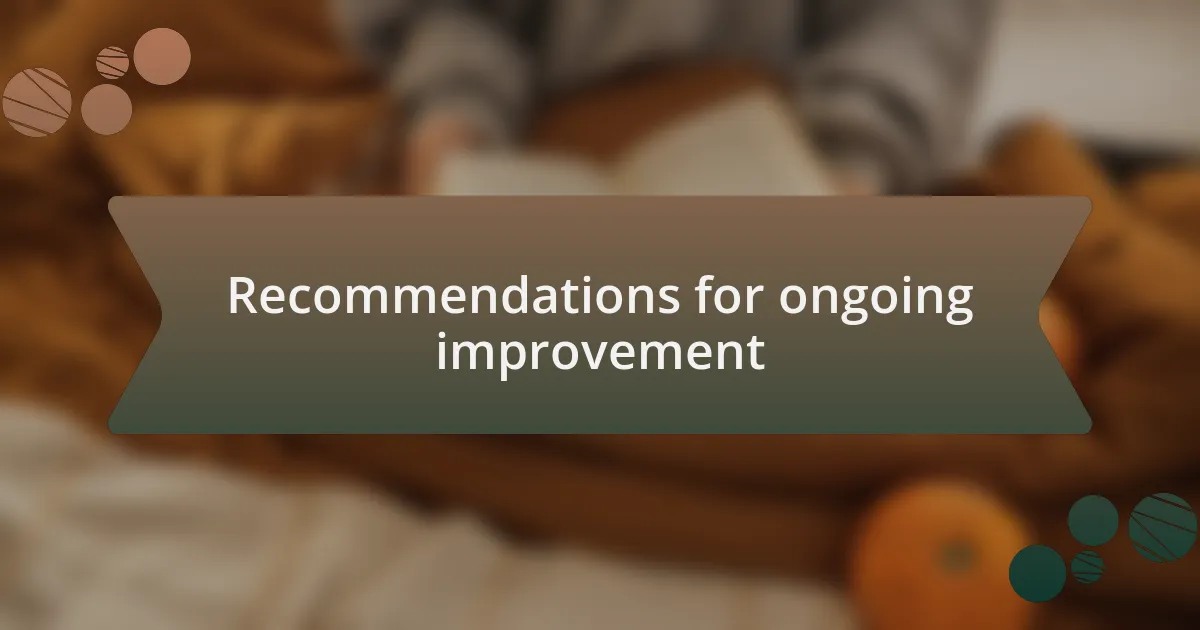
Recommendations for ongoing improvement
Continuous improvement is a journey I deeply value, and one method that has worked well for me is the practice of regular goal reassessment. I take time each month to reflect on what I’ve learned and how I can push myself further. Have you ever paused to evaluate whether your current goals still excite you, or if they need some tweaking to keep you motivated?
Another powerful strategy is embracing a growth mindset. When I faced setbacks, particularly during a challenging project, I learned to view failures not as roadblocks but as stepping stones. This shift in perspective opened new avenues for learning. How do you redefine obstacles in your own journey?
Building a network of supportive peers has also enriched my learning experience. I remember participating in a local writing group, where sharing my work elicited diverse perspectives. Those conversations not only expanded my understanding but also deepened my appreciation for collaboration. Have you considered the value of a community in your skill development?